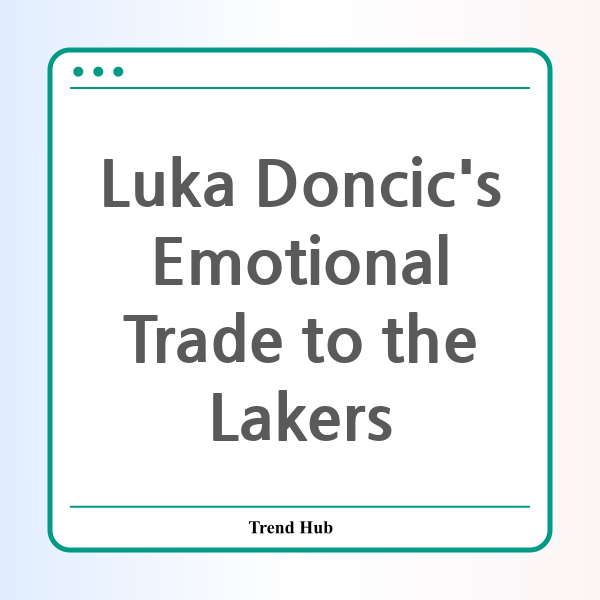* This website participates in the Amazon Affiliate Program and earns from qualifying purchases.

Have you ever felt your heart drop at the news of a major change in your life? For superstar Luka Doncic, that experience was all too real when he was traded from the Dallas Mavericks to the Los Angeles Lakers. The emotional fallout from this trade has not only captured the attention of basketball fans but has sparked discussions about loyalty, betrayal, and the personal toll that such decisions can have on professional athletes.
Upon hearing the news of his trade, Doncic's reaction was visceral and raw. He described the moment as shocking, saying he felt like his "heart was broken, honestly." This visceral response is palpable; Doncic reportedly threw his phone in frustration after the news broke. His manager even showcased the damaged device as a memento of that emotional upheaval—a cracked phone symbolizing the harsh reality of life as a professional athlete. In a league where loyalty is often touted but rarely demonstrated, Doncic's feelings of betrayal and sadness resonate deeply.
It's not just the physical act of being traded that affects players; emotional fallout from such decisions can be just as brutal. Doncic’s expression of disappointment over comments made by Nico Harrison, the president of basketball operations and general manager, further highlights the complexity of player-management relationships. "It's just sad the way he's talking right now," Doncic remarked, emphasizing how he feels about the way business decisions are made in the realm of sports.
This sentiment echoes across the league, as many players grapple with the ambiguity of loyalty in a business that prioritizes winning over stable relationships. The stark reality is that, for players, decisions made by management can upend their lives both on and off the court.
After the initial shock wore off, Doncic began to adjust to his new life in Los Angeles. Despite the emotional turmoil of the trade, he quickly became a pivotal player for the Lakers, averaging 28.2 points, 8.1 rebounds, and 7.5 assists in his first 28 games with the team. His performance has not only helped the Lakers secure a playoff spot but has also allowed him to demonstrate his resilience and skill in the face of adversity.
As Doncic prepares for the upcoming playoff series against the Minnesota Timberwolves, fans and analysts alike are eager to see how he channels his emotions into his performance on the court. Will the heartbreak transform into motivation? Can he turn this page and embrace his new chapter in L.A.? The answers to these questions may unfold in the games to come.
This trade saga raises larger questions about the nature of professional sports—questions about loyalty, betrayal, and the human experience behind the athleticism. As much as sports unite us as fans, they are also riddled with the complex emotions of the players who give their all for the game. Let's hope Luka Doncic can navigate this tumultuous journey and find success in the City of Angels, turning his pain into power as he leads the Lakers in their quest for an NBA Championship.
* This website participates in the Amazon Affiliate Program and earns from qualifying purchases.